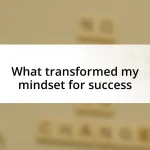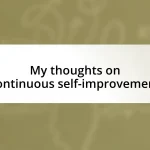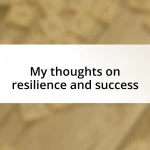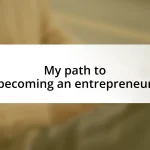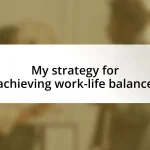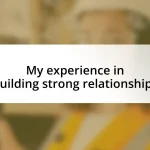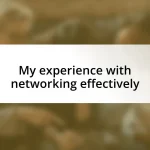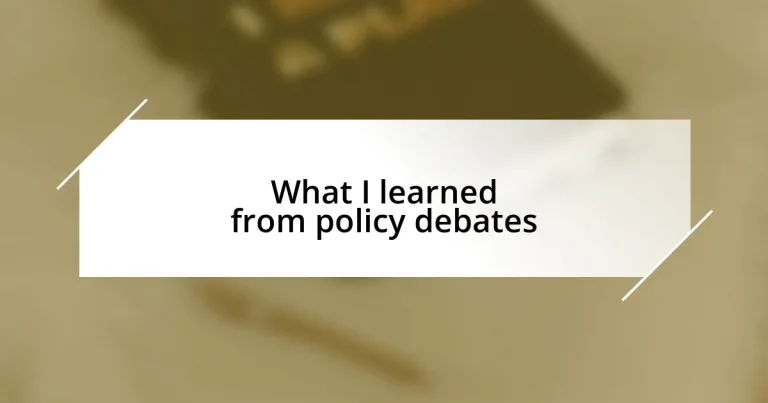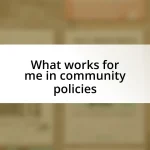Key takeaways:
- Understanding the structure and emotional impact of policy debates enhances confidence and responsibility in addressing societal issues.
- Critical thinking is essential for formulating well-rounded arguments, anticipating counterarguments, and improving communication skills.
- Persuasive arguments blend logical evidence with emotional appeal, enhancing relatability and impact during debates.
- Engaging with diverse perspectives fosters empathy and enriches understanding, crucial for effective policy discussions.
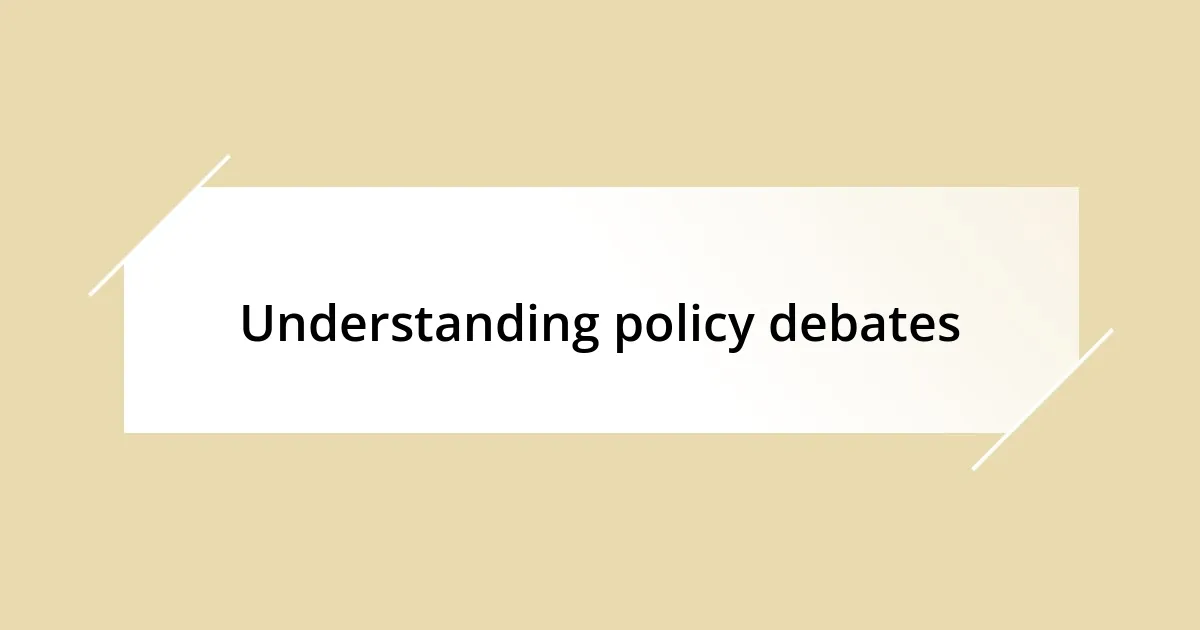
Understanding policy debates
Policy debates can seem overwhelming at first, but they are really just conversations about how to tackle societal issues. I remember my first debate; I felt like I was thrown into a pool without knowing how to swim. Have you ever had that sense of uncertainty? Once I learned to navigate the structure and the key arguments, I found it invigorating.
Understanding the format is crucial. Typically, policy debates focus on a resolution concerning a specific policy change, where teams argue for or against it. I still feel a rush of excitement when I see a resolution that sparks a strong emotional response. It makes you wonder—what would you fight for if you had the chance to impact policy directly?
What truly struck me during my experiences was the depth of research involved. There’s a moment when you realize that crafting a compelling argument requires more than just passion; it requires solid evidence and nuanced understanding. I vividly recall once spending hours sifting through statistics on climate change, and it hit me—this isn’t just a debate; it’s about real lives and futures. How can anyone not feel a sense of responsibility in these discussions?
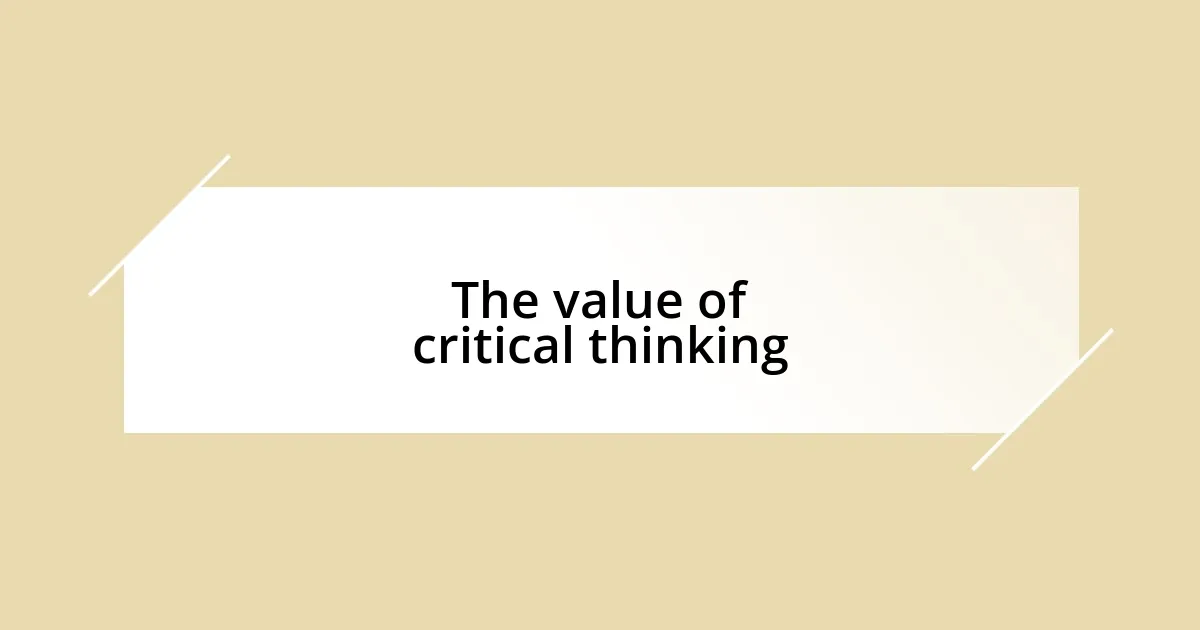
The value of critical thinking
Critical thinking is the backbone of effective policy debates. It empowers debaters to analyze issues from multiple perspectives, allowing them to construct well-rounded arguments. I remember during one debate, I found myself arguing against a viewpoint I initially agreed with, simply because the opposing side presented such compelling data. That moment taught me the importance of remaining open-minded. Have you ever flipped your stance after considering a different angle? It can be a game-changer.
Additionally, critical thinking helps in anticipating counterarguments. When I was preparing for a particularly tough debate, I practiced identifying potential weaknesses in my points. This preparation often led to surprising insights about my own stance. It felt like sharpening a tool before a big job—you want to ensure it’s effective and ready to cut through the noise.
Moreover, critical thinking enhances communication skills. Engaging with complex ideas and articulating them clearly fosters a deeper understanding. I recall a time when I struggled to explain a policy’s implications to my peers, but it forced me to break down my thoughts in a relatable way. The result? Not only did I grasp the concept better, but I also helped others understand it, too.
| Aspect | Critical Thinking |
|---|---|
| Argument Construction | Enables well-rounded arguments by analyzing multiple perspectives |
| Counterargument Anticipation | Encourages identification and preparation for opposing viewpoints |
| Communication Skills | Enhances clarity and understanding of complex ideas |
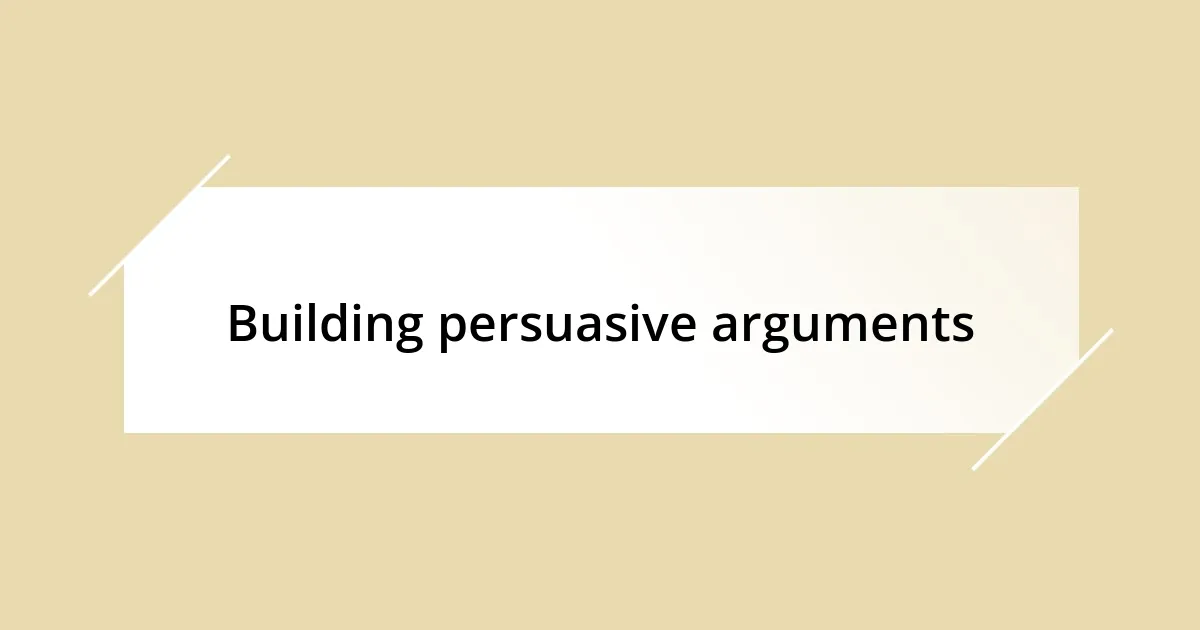
Building persuasive arguments
Building persuasive arguments is an essential skill I’ve honed through countless debates. I recall one particular round where I needed to defend a policy I wasn’t entirely comfortable with. It felt like I was wearing a suit that didn’t quite fit. However, I learned that when you believe in your argument and present it with confidence, it can resonate with both judges and the audience—even when you’re unsure. I felt nervous speaking, yet I found strength in weaving in personal stories to illustrate my points, making them more relatable and impactful.
When constructing persuasive arguments, consider these critical elements:
- Clear Thesis: Establish a strong position that defines your stance.
- Relevant Evidence: Use statistics and data to back up your claims.
- Emotional Appeal: Incorporate stories that resonate on a personal level.
- Logical Structure: Organize your arguments in a way that flows naturally and builds upon each point.
- Counterargument Acknowledgment: Recognize opposing views to show strength and foresight.
I learned that the most persuasive arguments come alive when they blend emotion with reason. A teammate once shared a personal story about his family’s experience with healthcare, and it struck a chord in every listener. That moment reinforced to me just how powerful a well-crafted argument, rooted in both logic and personal experience, can truly be.
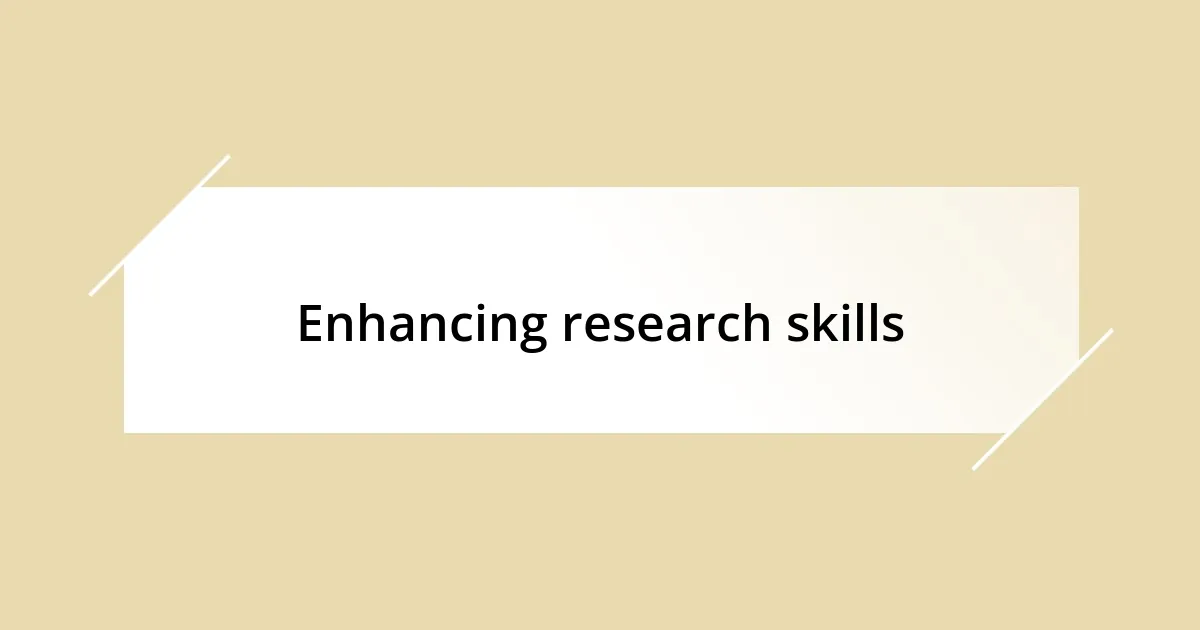
Enhancing research skills
Enhancing research skills has been a game-changer for me in policy debates. I vividly recall preparing for a debate on climate policy when I dove deep into scientific journals and articles, uncovering data I had never encountered before. I was amazed at how a single piece of research could shift the entire foundation of an argument. Have you ever stumbled upon an unexpected fact that completely changed your perspective? It’s a thrilling experience that reinforces the importance of thorough research.
The thrill of discovery doesn’t just enhance my arguments; it deepens my understanding of the topic at hand. I remember feeling overwhelmed by the sheer volume of information, but breaking it down into manageable sections made it more approachable. By asking myself questions like, “What are the core issues?” and “How do these statistics support my stance?” I developed a systematic approach to extracting key insights from dense material. This not only made me more confident in my claims but also made my presentations much more compelling.
Finally, I realized that research is about more than just collecting data—it’s about connecting dots. During one lively debate, I drew a connection between historical policies and their outcomes, which left my opponents momentarily speechless. I had unlocked a narrative that transformed dry statistics into a story with real-world implications. Have you ever tried to weave narratives from your research? It’s incredible how this approach can turn abstract ideas into relatable experiences. This shift in perspective has helped me advocate passionately for issues that matter.
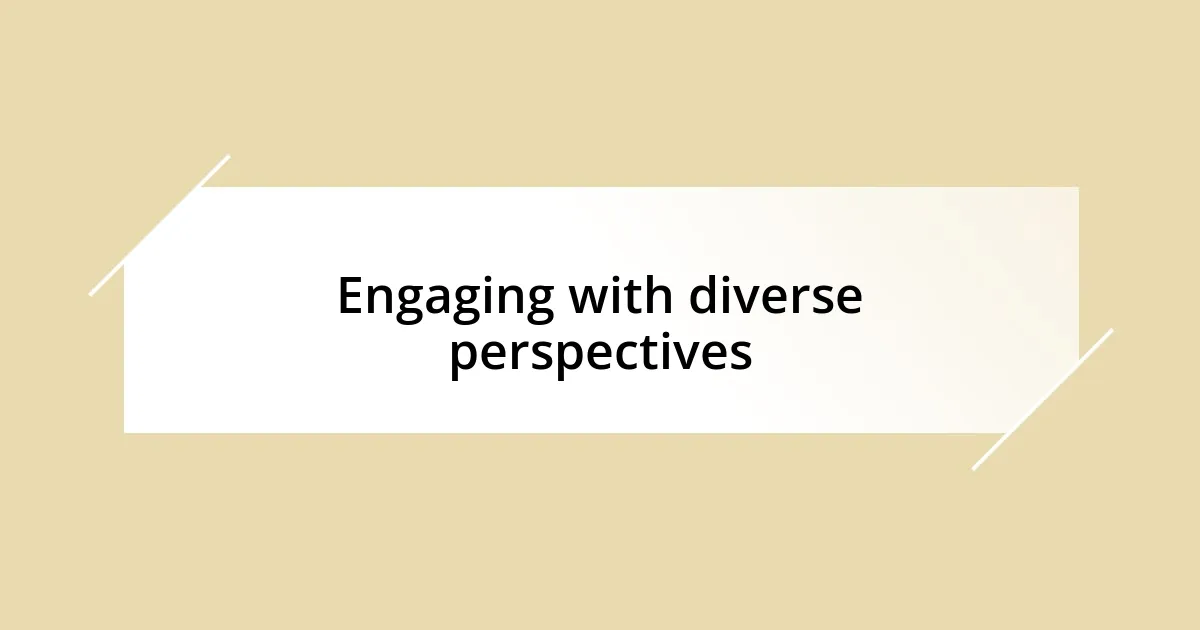
Engaging with diverse perspectives
Engaging with diverse perspectives has been eye-opening for me throughout my debate experiences. I distinctly remember a round where my opponent presented an argument from a cultural viewpoint I hadn’t fully considered. It made me realize the richness in understanding how different backgrounds shape opinions. Have you ever found yourself challenged by a perspective that seemed worlds apart from your own? That moment taught me to appreciate the nuances behind each argument and the value of empathy in discussions.
As I participated in these debates, I noticed a transformative effect when I stepped outside my comfort zone. I was once paired with a teammate from a different region whose views on education policy challenged my entrenched beliefs. Initially, I felt defensive, but I learned that engaging in open dialogue allowed us to find common ground. It was like navigating a puzzle together, piecing our insights until we created a more robust understanding of the issue. This experience left me pondering: how often do we dismiss unfamiliar ideas without truly exploring them?
Moreover, embracing diverse perspectives enriched my own thought process tremendously. I recall a debate focused on immigration policy where every competitor brought unique stories to the table. Hearing personal narratives about their journeys made the statistics come alive, transforming a complex issue into a human one. It struck me how powerful it is to incorporate personal histories, making discussions more relatable. Reflecting on these insights motivates me to actively seek out differing viewpoints; they often reveal aspects of a topic I overlooked before. How can we create more space for these vital conversations in our lives? Embracing diverse perspectives is essential for growth and understanding.
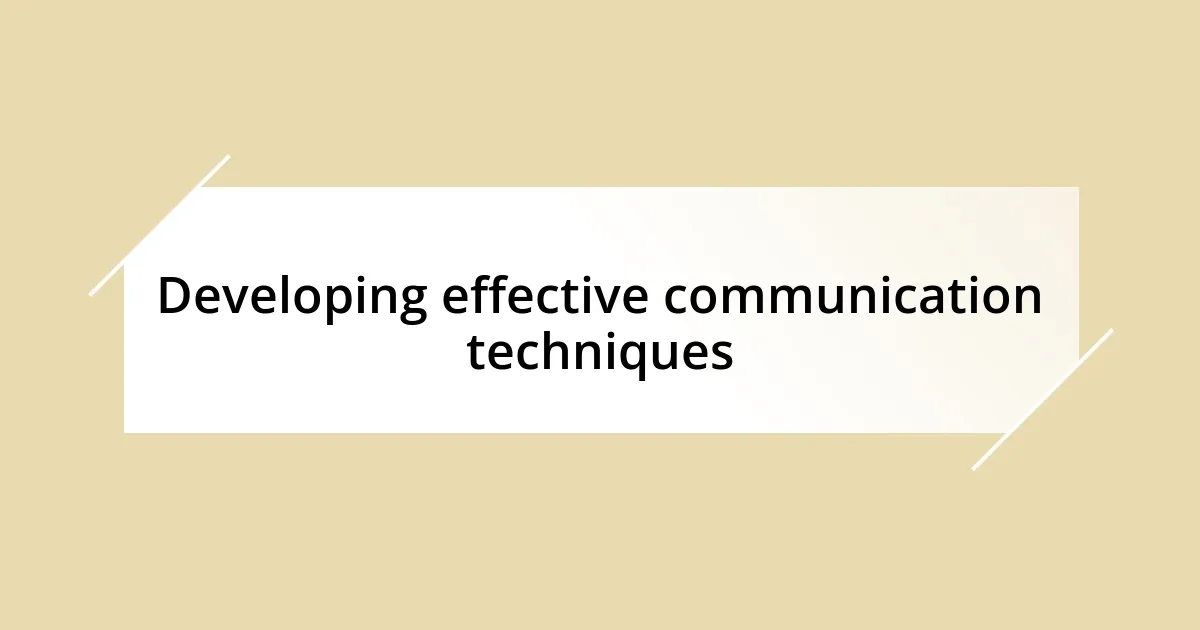
Developing effective communication techniques
Developing effective communication techniques has truly been a journey for me in the realm of policy debates. I can still recall the first time I realized the power of clear articulation during a high-stakes round; I stumbled over my words, and my argument lost its punch. It hit me then—how you say something can be just as crucial as what you say. Have you ever noticed how a confident speaker can sway opinions just by their delivery? This made me prioritize practice and seek feedback, which helped me refine my speech patterns and enhance my overall presence.
One strategy that proved invaluable was learning to read my audience. During a particularly contentious debate, I was surprised at how much the room’s reactions influenced my approach. I started adapting my content based on their expressions and body language, which created a more dynamic dialogue. It also dawned on me that asking rhetorical questions can engage listeners effectively. For example, I would pose questions like, “What if we viewed this issue from another angle?” It often sparked discussions and allowed me to gauge where to steer the conversation next.
Moreover, I discovered the significance of storytelling in making a connection. I remembered a debate on healthcare where I shared a personal story about my grandmother’s experience navigating the system. I noticed how the room shifted; suddenly, the data-driven arguments became more relatable. After that experience, I realized the emotional weight stories carry. They bridge gaps and foster understanding, transforming abstract policies into real-life impacts. How often do we underestimate the power of storytelling in our discussions? Embracing this technique has not only enriched my debates but also deepened the conversations I have outside the debate chamber.
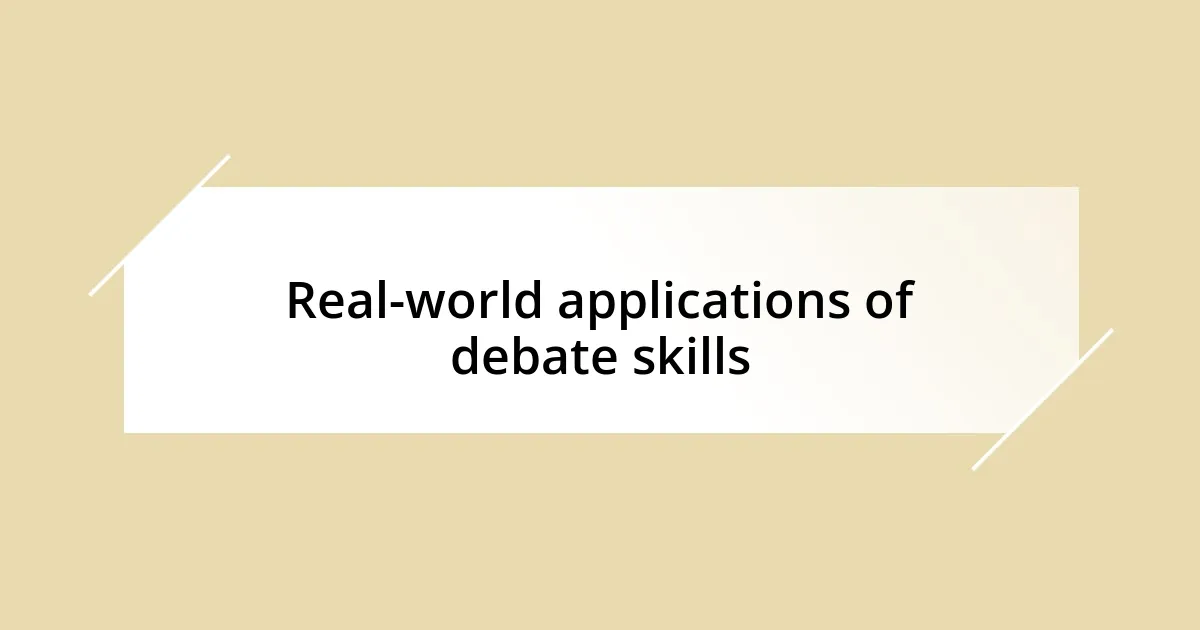
Real-world applications of debate skills
I’ve found that the skills I developed in debate extend far beyond the competition; they seep into my day-to-day interactions. For instance, during team meetings at work, I apply the art of persuasive argumentation and active listening learned from debates. Instead of just stating my ideas, I now structure them as compelling narratives that invite collaboration. Have you noticed how framing discussions can significantly influence outcomes? It’s fascinating how a well-crafted argument can turn a mundane meeting into an engaging conversation.
One of the most remarkable applications has been in conflict resolution. I remember a tense situation between friends where differing viewpoints seemed insurmountable. Drawing on my debate training, I facilitated an open dialogue, encouraging each person to express their thoughts while I summarized their points to find commonality. It felt rewarding to see how reframing their arguments helped each side understand the other’s perspective. Have you ever played the role of mediator? That experience taught me that fostering understanding is often just a matter of effective communication and patience.
The ability to think critically and evaluate information quickly has armed me with a unique advantage when assessing current events. I reflect on instances where I’ve attended community forums or local town hall meetings. With my debate background, I can sift through information, distinguish credible sources, and articulate my views on complex issues like climate change or urban development. This skill not only enhances my civic engagement but also inspires others around me to delve deeper into important topics. Do you think everyone could benefit from this type of critical thinking? I believe it’s a powerful tool that can enrich our collective conversations and lead to informed decision-making.

